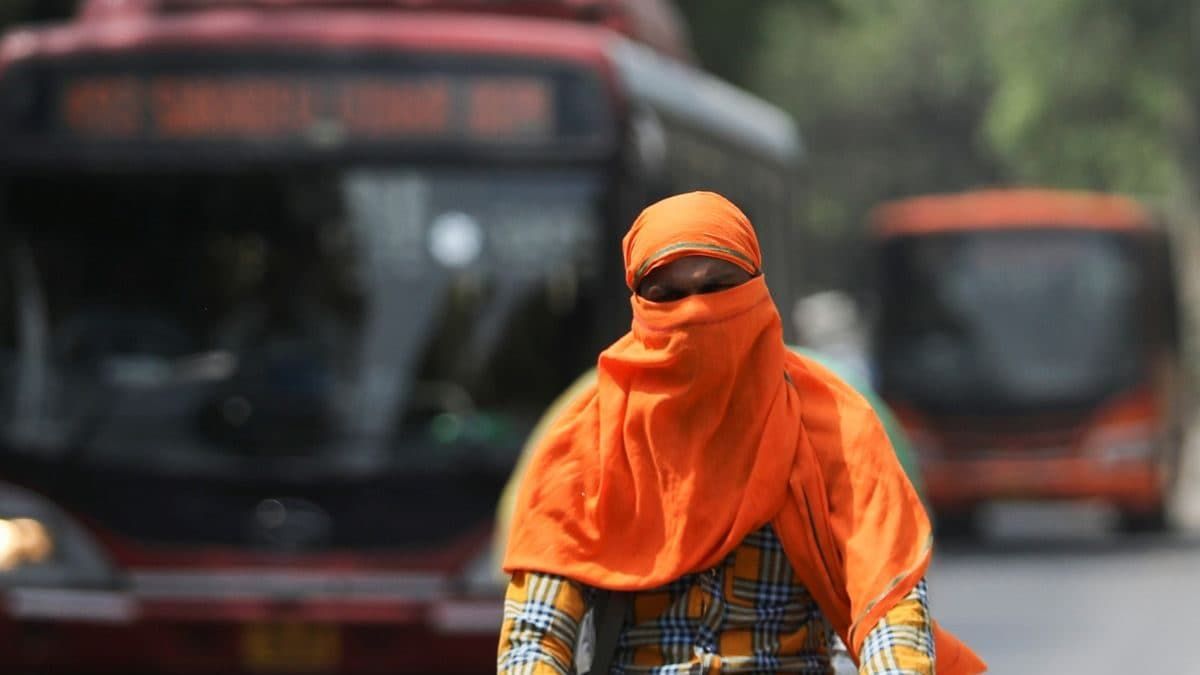The IMD has forecast severe heat wave conditions and strong surface winds during the day. (Image via Reuters)
Delhi Heat Wave: An IMD red alert means extremely dangerous weather conditions, with temperatures expected to reach critically high levels, posing a significant risk to public health and safety.
Delhi is currently experiencing an intense heat wave, with temperatures exceeding 47 degrees Celsius. The India Meteorological Department (IMD) has issued a 'red alert' for the next five days. The capital has been enduring a relentless rise in temperatures, hitting the highest temperature this summer at 44.4 degrees Celsius on Sunday. Temperatures of 43.6 degrees Celsius were recorded on Saturday, a notable increase from 42.5 degrees Celsius on Friday.
An IMD red alert means extremely dangerous weather conditions, with temperatures expected to reach critically high levels, posing a significant risk to public health and safety.
As temperatures rise to 45-47 degrees Celsius, the number of patients presenting with heat-related illnesses has increased significantly. Dr Pankaj Chaudhary, senior consultant, internal medicine, Max Hospital, Vaishali, observes, “I see about 8 to 10 patients daily in the hospital and clinic.” Extreme heat has profound effects on our bodies, requiring precautionary measures to ensure safety.
Dr Mohan Kumar Singh, senior consultant, internal medicine, Marengo Asia Hospital, Gurugram, highlights the increasing frequency of heat waves in the Delhi-NCR region. “Heat exhaustion, heat stroke, and dehydration can result from exposure to extreme temperatures and heat waves,” he explains.
Sweating depletes the body of fluids and electrolytes, causing dehydration and an imbalance of vital minerals. This can hinder the body's ability to regulate temperature, causing symptoms such as headaches, nausea, weakness, and dizziness. If left untreated, it can progress to heat exhaustion or life-threatening heat stroke.
The impact of extreme heat on the body
Dr. Chaudhary Shares Negative Impact on Multiple Organs
- heart tensionHigh temperatures force the heart to work harder to maintain blood flow to the skin, which helps dissipate heat.
- DehydrationExcessive sweating causes rapid dehydration, electrolyte imbalances, and possible kidney stress.
- Cognitive functionHeat can affect cognitive function, affecting memory and judgment. Severe cases can cause dangerous brain swelling.
- Mental healthHigher temperatures are linked to increased anxiety, depression and even suicide rates.Physical effects:
- Increased blood flowThe heart strains as blood flow to the skin increases. For every 0.5°C increase in core temperature, a person's heartbeat increases by 10 beats per minute, causing a rapid pulse and dizziness.
- FatigueThe brain sends signals to the muscles to slow down, causing fatigue.
- Nerve failuresSymptoms such as headaches, nausea or vomiting are due to a malfunction of the nerve cells.
Tips for staying safe in extreme heat
Dr. Singh offers these tips:
- Keep hydratedDrink plenty of water to prevent dehydration.
- Avoid direct sun exposureSeek shade or stay indoors during the hottest hours (usually between 10 a.m. and 4 p.m.).
- Wear light clothingOpt for loose-fitting, light-colored clothing to help your body cool down.
- Use fans or air conditioningKeep your living spaces cool.
- Limit physical activityAvoid strenuous exercise during extreme heat.
- Check on vulnerable peopleOlder people, young children, and people with pre-existing health problems are more susceptible to heat-related illnesses.
- Never leave children or pets in hot carsEven a few minutes in a hot car can be life-threatening.
Recognize signs of heat-related illnesses
- heat crampsMuscle cramps, usually in the legs or abdomen.
- Heat exhaustionSymptoms include severe sweating, weakness, dizziness, nausea, and headache.
- HeatstrokeA medical emergency characterized by high body temperature, confusion, rapid pulse, and unconsciousness.
By taking these precautions and staying informed about the signs and symptoms of heat-related illnesses, you can protect yourself and others during extreme heat events. Staying hydrated, seeking shade, and wearing appropriate clothing are simple but effective measures to ensure safety and comfort in hot climates.












